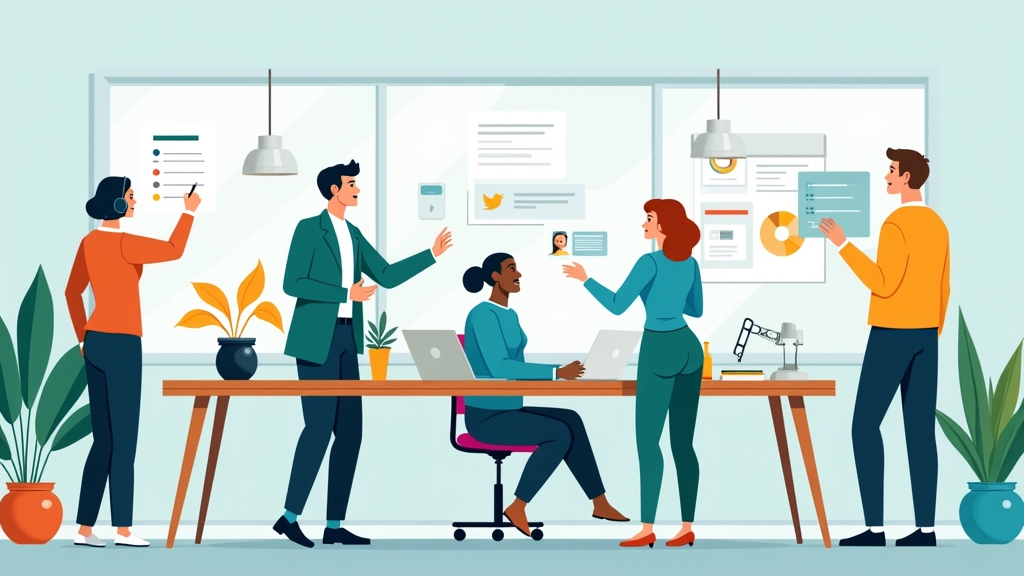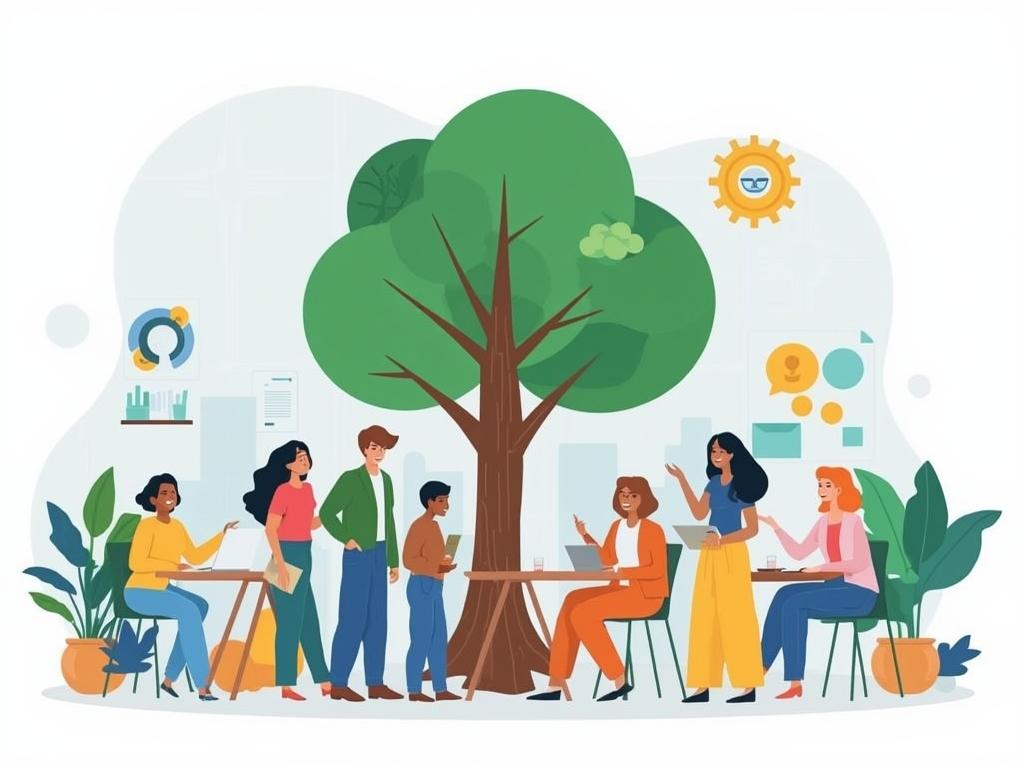The Role of Neurodiversity in the Job Market: How Companies Are Adapting
What is neurodiversity and why does it matter?
Neurodiversity is a concept that recognizes and values cognitive differences between people, understanding that conditions such as ADHD, autism, dyslexia and others are not necessarily disabilities, but natural variations of the human brain. Imagine a world where everyone thought the same way - it would be dull and not very innovative, wouldn't it? Neurodiversity brings unique perspectives, differentiated skills and creative solutions that often go unnoticed in traditional environments.
Companies that embrace neurodiversity aren't just meeting quotas or following trends - they're discovering exceptional talent. People with autism, for example, can have an extraordinary capacity for patterns and details, while individuals with ADHD often excel in dynamic environments where multitasking and creativity are valued. The question is: how can organizations adapt to make the most of these potentials?
A study by Harvard Business Review has shown that companies that implement inclusion programs for neurodivergents see improvements in productivity, innovation and organizational culture. But for this to happen, we need to go beyond talk - we need to create structures that really welcome and develop these professionals.
Have you ever stopped to think how many brilliant minds may be underused simply because the market hasn't yet learned to deal with their particularities? Neurodiversity is not a challenge, but an opportunity. And the companies that realize this first will reap the rewards of a more diverse and innovative team.
The challenges faced by neurodivergent professionals in the corporate environment
Despite advances, many neurodivergent professionals still face significant barriers in the job market. From standardized selection processes that don't take into account different forms of communication, to hostile sensory environments - such as noisy offices or intense lighting - the obstacles are diverse. What's worse, these difficulties are often interpreted as a lack of competence, when in fact they reflect a mismatch between the individual's needs and the company's structure.
For example, a person with autism may have difficulty in conventional interviews, where eye contact and rapid communication are valued. However, if the company offered an alternative process - such as practical tasks or written interviews - it could uncover exceptional talent in data analysis or programming. Is the problem with the candidate or with the outdated recruitment format?
Advertising
In addition, a lack of flexibility in everyday life can be a major obstacle. Professionals with ADHD, for example, may experience productivity peaks at unconventional times or need frequent breaks to maintain focus. Companies that insist on rigid working hours and micromanagement are unwittingly sabotaging the performance of these employees.
But there is light at the end of the tunnel. Organizations like SAP and Microsoft have already implemented specific programs to hire and retain neurodivergent talent, showing that it is possible - and advantageous - to do things differently.
How companies are adapting to include neurodivergents
Including neurodivergents in the job market requires more than goodwill - it demands concrete changes in organizational culture and processes. And some companies are leading this movement. One of the most effective strategies is to review recruitment processes. Instead of relying solely on traditional interviews, companies like EY are adopting assessments based on practical skills, allowing candidates to demonstrate their potential in alternative ways.
Another important step is adapting the working environment. For many autistic people, for example, sensory stimuli such as fluorescent lights or loud noises can be overwhelming. Companies that invest in quiet spaces, adjustable lighting and remote working options are not only facilitating inclusion, but also improving the well-being of all employees. After all, who doesn't like a more comfortable environment?
Training managers is also crucial. Leaders who understand the particularities of neurodiversity can offer personalized support, such as flexible deadlines, clear instructions and direct feedback - something that especially benefits professionals with ADHD or dyslexia. Have you ever thought about how small adjustments can transform an employee's experience?
Mentoring programs and affinity groups have also proved effective. Companies like JPMorgan Chase have created internal support networks where neurodivergents can share experiences and strategies for navigating the corporate environment. These initiatives not only promote inclusion, but also strengthen a sense of belonging.
Success stories: companies that are making a difference
Some organizations are already reaping the rewards of investing in neurodiversity. Microsoft, for example, launched the Neurodiversity Hiring Program, which has adapted its entire selection process for autistic candidates. Since 2015, the initiative has hired dozens of professionals who excel in areas such as software engineering and data analysis. And the best part: the retention rate of these employees is significantly high.

Another inspiring example is SAP, which has a global project to include autistic people. The company has not only adjusted its recruitment practices, but also offers ongoing training for managers and teammates. The result? Neurodivergent professionals at SAP are contributing innovative solutions, especially in areas that require meticulous attention to detail.
And it's not just the tech giants that are taking part in this movement. A Walgreens implemented a program in its factories that prioritizes the hiring of people with cognitive disabilities. Surprisingly, these production lines have become the company's most efficient, proving that neurodiversity can be an operational asset.
What do these cases have in common? They all show that when companies are willing to rethink their models, the results go beyond inclusion - they bring real competitive advantages. Is your organization ready to follow this path?
Tools and technologies that support neurodiversity at work
Technology can be a great ally in the inclusion of neurodivergent professionals. Tools such as time management applications (Todoist or Trello) help people with ADHD organize tasks and deadlines. Text-to-speech software such as NaturalReaderare useful for dyslexics who need to proofread long documents.
Communication platforms are also adapting. O Slackfor example, allows users to customize notifications and reduce unnecessary stimuli - a relief for those with sensory sensitivities. And let's not forget noise-canceling headphones, which transform noisy offices into more accessible spaces.
But technology alone is not enough. It is essential that companies offer training so that everyone knows how to use these tools effectively. How many times is an incredible resource underused because no one has explained how it works?
Personalization is also key. While an autistic professional may benefit from visual agendas, another with ADHD may prefer frequent reminders on their cell phone. The key is to listen to individual needs and offer options - not generic solutions.
How can you contribute to a more inclusive environment?
The inclusion of neurodivergents is not just the responsibility of HR or leadership - it's a collective effort. Small attitudes in everyday life can make a big difference. For example: when giving instructions to a colleague with autism, be clear and avoid subjective language. If a teammate with ADHD seems distracted, offer to help prioritize tasks instead of judging.
Another way to contribute is to educate yourself about neurodiversity. Books such as "NeuroTribes by Steve Silberman or documentaries such as "The Reason I Jump on Netflix can open up new horizons of understanding.
You can also be an ally by defending inclusive policies in your company. Suggest talks on the subject, take part in diversity committees or simply start conversations about how the team can be more welcoming. Have you ever thought about the impact your voice can have?
Remember: inclusion is not about treating everyone equally, but about ensuring that everyone has the same opportunities to shine. And that starts with each and every one of us.
The future of work is neurodiverse - and that's great
As more companies recognize the value of neurodiversity, the job market is undergoing a silent - but powerful - transformation. Instead of forcing people to fit into outdated molds, progressive organizations are discovering that adapting to human differences generates better results for everyone.
Imagine a future where selection processes assess real skills rather than interview performances. Where work environments are designed to maximize the potential of each individual. Where conditions such as autism or ADHD are not stigmas, but characteristics that add to diversity of thought. This future is not only possible - it is already being built by visionary companies.
What about you? Are you ready to be part of this change? Whether as a professional, a manager or simply as someone who believes in a more inclusive world, your attitude makes a difference. How about starting today?



